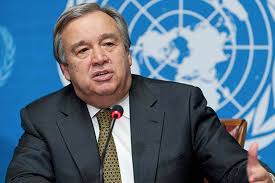By Haruna Gimba
The United Nations Secretary-General, António Guterres has released $100 million from the UN Central Emergency Response Fund (CERF), to sustain aid operations in nine neglected emergencies.
CERF’s largest allocation of the year will reach more than 6 million people in crises where levels of vulnerability are alarmingly high but funding remains critically low.
According to press statement issued by Head, Strategic Communications Unit United Nations Office for the Coordination of Humanitarian Affairs (OCHA), Ethiopia, Choice Ufuoma Okoro, the countries are Cameroon, the
Democratic People’s Republic of Korea, Libya, Madagascar, Mali, Niger, Nigeria, Somalia and Uganda.
“CERF is a lifeline for people caught up in crises that don’t make the headlines but where needs are just as urgent,” said the Secretary-General.
“This funding is crucial so that the UN and partners can continue assisting people who need our help so desperately. I thank all Member States and donors who have made this possible,” he added.
A large portion of the funds will reach people affected by displacement, one of the most pressing humanitarian challenges in today’s world where more than 65 million people are displaced.
CERF funds will ensure that millions of people who fled Boko Haram-related violence and conflict in Nigeria, Niger and Cameroon will receive health care, food assistance and shelter.
In Somalia, Uganda and Libya, CERF will bring relief to internally displaced people and refugees from neighbouring countries. Urgent support will also reach those suffering from malnutrition and food insecurity in Madagascar, Mali and DPRK.
This allocation of $100 million addresses only a small portion of urgent humanitarian needs. As the scale and intensity of emergencies continue to increase, a larger, more robust CERF is needed so that aid can reach people, whenever and wherever crises hit. To this end, the UN General Assembly has endorsed former Secretary-General Ban Ki-moon’s recommendation to double CERF’s annual target to $1 billion by 2018.
“CERF is one of the fastest ways to provide urgent aid. The allotment approved today will save lives in all nine countries,” said Emergency Relief Coordinator and Under-Secretary-General for Humanitarian Affairs Stephen O’Brien.
“As we race to address the humanitarian challenges of today, our goal of a $1billion CERF is vital so that help reaches people, whenever and wherever crises hit. A strong CERF — for all and by all – is a key step towards our shared commitment to leave no one behind.”





